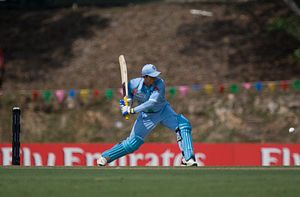Waheed, a part time actor and a professional cook based in Kabul, could barely hide his anxiety the day before India’s match against South Africa in the Cricket World Cup. The fact that India has never beaten the Proteas in the World Cup was not lost on Waheed, and the thought left him restless. Waheed is not the only Afghan who is pulling for India in the World Cup, which runs through the end of next month in Australia and New Zealand. In fact, many Afghan cricket lovers are vouching for their neighbor and partner.
“I like India,” Waheed says. “I lived in Pakistan for 16 years, but I can’t root for them. Pakistan has been bad news for Afghanistan ever since it was formed. I was ecstatic when Team India thrashed Pakistan in the World Cup.”
Large sections of Afghanistan, especially among the youth, harbor ill will toward Pakistan. That sentiment is reflected by throngs of fans turning out to support India, Islamabad’s archrival both on and off the field.
However, when Afghanistan faces off against India, that support evaporates. Afghans want their national team to win, but at the same time, they don’t feel bad when their rookie team loses to a group of seasoned veterans.
“We are a new team,” Naziba, a waitress in a leading hotel in Kabul, explains. “We are still learning. Afghan players can learn a lot from India. We don’t feel so bad when we lose to India, but it hurts when we lose to Pakistan.”
The 2015 Cricket World Cup has revealed South Asia’s political fault lines. Many in Afghanistan want to see India emerge as a winner and have little sympathy for Pakistan’s poor run of luck at the tournament so far. Bahar, a friend of mine in Afghanistan, never seems to tire of reliving Pakistan’s defeat in the first game of the tournament at the hands of India.
But at the same time, Bahar does not forget to mention the political and geostrategic importance of Pakistan in the larger context of Afghanistan.
Kabul has been trying to improve relations with Islamabad over the past six months, since President Ashraf Ghani came to power. Senior officials have shuttled back and forth between the two countries, which share a 2,200 kilometer border. To win the confidence of Islamabad, Ghani has canceled military assistance that Afghanistan sought from India under the tenure of Hamid Karzai.
People on the street understand that Kabul has been trying to strike a balance between New Delhi and Islamabad. But Afghans are also wondering if they can trust Pakistan, and their doubts reveal deep-seated animosity.
“Pakistan has always played games with Afghanistan,” says Shahpoor Akbari, a graduate of Kabul University working as a driver. “The scourge of the Taliban and radical terrorism are Pakistani problems. Pakistan thrives on the blood of Afghans.”
“Kabul and major sections of the country are witnessing a phase of relative calm these days,” Akbari adds. “That’s because of improved relations with Pakistan, not the rise of the new government. We have always maintained that Pakistan sponsors terrorism inside Afghanistan. Kabul is finally engaging Pakistan. That’s why there is relative calm Afghanistan.”
Though it’s hard to find anyone who will openly get behind Akbari’s statement, it seems to be the predominant perception in Afghanistan.
“Pakistan is a necessary evil we have to deal with,” says Karim Sharifi, a local journalist. His views on India are quite different: “President Ghani knows that India can never be angry with Afghanistan and it is always there to help us out.”
Noor Mohammad, a business graduate and translator, views the relationship between Kabul and Islamabad with a great deal of skepticism. “It is impossible for the two Islamic neighbors to be good friends,” he says. “So long as Pakistan sees my country as just part of its sphere of influence, there can be no reconciliation. I think Islamabad wants to limit India’s influence in Afghanistan. That is why it is developing its proximity to us.”
Anti-Pakistan sentiment in Afghanistan is reflected by many Afghans’ preference for India to win the 2015 Cricket World Cup. In the subcontinent, cricket is not just a game; it mirrors politics.

































